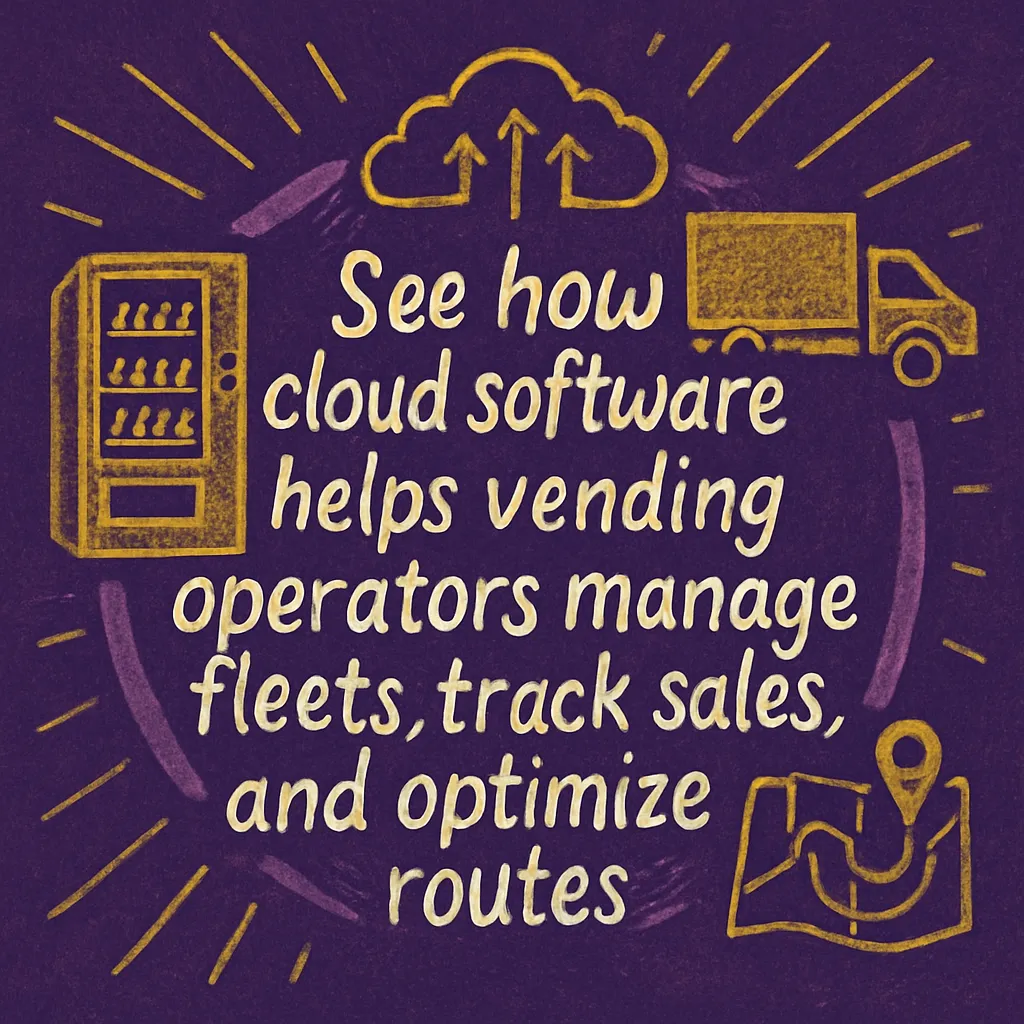Cloud-Based Vending Management Systems
See how cloud software helps vending operators manage fleets, track sales, and optimize routes.
Back to Vending Technology ResourcesSee how cloud software helps vending operators manage fleets, track sales, and optimize routes.
Back to Vending Technology ResourcesCloud-based vending management systems provide real-time insights and remote control, transforming how vending businesses operate for maximum efficiency and profitability.
![]() Real-time inventory and sales data at your fingertips
Real-time inventory and sales data at your fingertips
![]() Automated route planning optimizes efficiency and reduces costs
Automated route planning optimizes efficiency and reduces costs
![]() Proactive maintenance alerts minimize downtime and improve customer satisfaction
Proactive maintenance alerts minimize downtime and improve customer satisfaction

In today's fast-paced world, managing a vending business efficiently requires more than just filling machines. Cloud-Based Vending Management Systems (VMS) offer a revolutionary approach, providing operators with unparalleled control, insights, and automation. By leveraging the power of the internet, these systems transform scattered data into actionable intelligence, allowing for smarter decisions and increased profitability.
One of the most significant advantages of a cloud-based VMS is real-time data access. Operators can monitor sales, inventory levels, and machine status from anywhere, at any time. This immediate feedback helps in making informed decisions about restocking schedules, product assortment, and pricing. Imagine knowing exactly which products are selling fastest in each machine or when a machine needs attention before it even impacts customer experience. This precision minimizes waste, reduces stockouts, and ensures popular items are always available. To understand more about remote monitoring, you can read about understanding vending machine technology.
Cloud-based systems excel at optimizing logistical aspects of vending operations. By analyzing sales trends, inventory needs, and machine locations, the VMS can generate the most efficient service routes. This means less fuel consumption, reduced drive times, and more productive use of staff hours. The ability to group service calls based on immediate needs, rather than fixed schedules, leads to significant cost savings and improved operational workflow. Selecting vendors with advanced VMS capabilities can further enhance these efficiencies.
Beyond internal efficiencies, cloud-based VMS directly impacts customer satisfaction. Machines equipped with these systems can integrate advanced payment solutions, including cashless and mobile options, catering to modern consumer preferences. Crucially, the systems also provide predictive maintenance alerts, identifying potential issues before they cause a machine to fail. This proactive approach ensures machines are consistently operational, well-stocked, and offering a seamless purchasing experience. For businesses considering different operational models, understanding the nuances between options like vending service vs buying machines is essential.
Embracing a Cloud-Based Vending Management System is a strategic step for any vending business looking to scale, optimize resources, and deliver a superior experience to their customers. It moves beyond traditional manual processes, ushering in an era of intelligent, data-driven vending management.
It's a software solution that allows vending operators to remotely monitor, manage, and optimize their vending machines and operations over the internet.
It enables real-time data access, efficient route planning, inventory management, cashless payment processing, and proactive maintenance alerts, leading to increased profitability and reduced operational costs.
Key features include remote monitoring, sales tracking, inventory management, route optimization, cashless payment integration, predictive maintenance, and reporting analytics.
Many modern cloud-based systems are designed to be compatible with a wide range of vending machines, often requiring a telemetry device to connect legacy machines.
Reputable cloud-based VMS providers utilize robust security measures, including data encryption, secure servers, and regular backups, to protect your operational data.
It provides real-time stock levels for each machine, alerts for low inventory, and insights into product popularity, allowing for precise restocking and reduced waste.
Yes, by analyzing sales data and inventory levels, the system can dynamically generate the most efficient routes for restocking and maintenance, saving time and fuel costs.
You can typically access detailed reports on sales performance, product trends, cash flow, machine uptime, and route efficiency, helping you make informed business decisions.
Costs vary, but the long-term benefits in efficiency, reduced operational expenses, and increased revenue often provide a significant return on investment, making it a cost-effective solution.
It enables reliable cashless payment options, ensures machines are rarely out of stock, and allows for quick resolution of technical issues, leading to higher customer satisfaction.